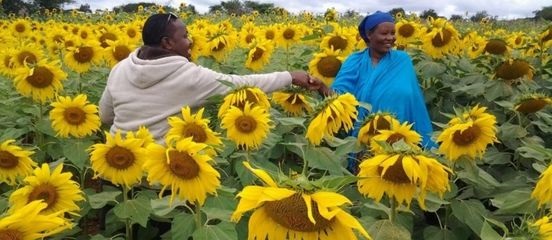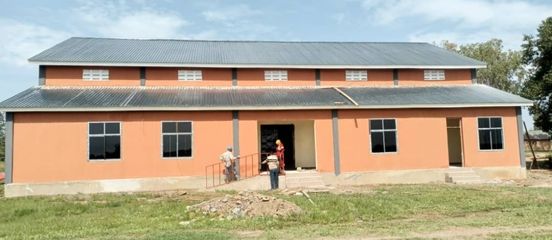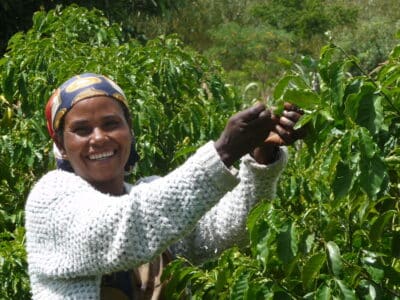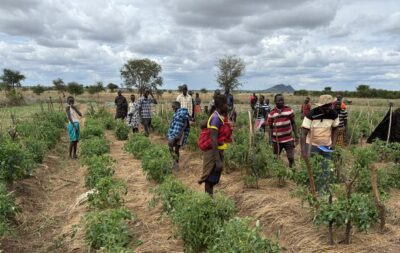News
16 August 2022
Empowering female sunflower farmers

Photo: Farm Africa / Eliza Powell
Farm Africa is working in northern and central Tanzania to support women’s participation in the sunflower value chain, increasing female farmers’ productivity and linking them to lucrative markets.
Tanzania is seeing a growing demand for sunflower oil and the government is committed to boosting the edible oils sector and reducing imports, meaning there are exciting prospects for sunflower growers.
But not everybody can reap these opportunities. Poor production practices, lack of access to quality agricultural inputs like seeds and fertilisers, and lack of access to markets and cooperatives hold many farmers back – particularly women.
These barriers stop female farmers from enjoying the full benefits of their labour, and stop many women from participating in the sunflower sector altogether.
Agricultural Marketing Cooperative Societies (AMCOS) are a way for farmers to collectively organise. AMCOS allow farmers to pool resources and collectively market their yields to buyers.
However, women only represent 17% of members in AMCOS. Many female farmers practise subsistence farming and are unaware of or are excluded from the potential of collective marketing.
Our Flourishing Futures project, which started in 2017 with the support of The Agricultural Markets Development Trust (AMDT), supported more than 15,500 farmers (45% of whom are female) to establish or develop sunflower businesses.
The project engaged relevant market actors (eg input suppliers, agro-dealers and processors) and service providers (eg financial institutions, government and private extension services providers and mechanisation and technology companies) to promote drought-tolerant varieties of seeds, invest in purchasing and offering bundled services, and deliver training in good agricultural practices, climate-smart agriculture, organisation management and market-oriented production and sales.
In January 2021, Farm Africa started a new sunflower project in Tanzania, building on the lessons learnt from Flourishing Futures. Funded by UN Women, the project works to counter gender inequalities by increasing women’s participation in the sunflower value chain, increasing their productivity and linking them to markets to maximise profits.
GOOD AGRICULTURAL PRACTICES
A key objective of the project is to increase female farmers’ yields through the application of good agricultural practices such as timely and appropriate land preparation; adequate spacing between and within rows of plants, and good weeding techniques.
A total of 303 smallholder farmers (217 being female) have been trained in good agricultural practices and climate-smart agriculture. As a result, 76% of smallholder farmers adopted most of the good practices and have seen their sunflower yields increase.

Of the 303 farmers supported, 61% have increased their sunflower productivity so far. The average productivity of yields increased from 240 kg/acre to 524 kg/acre.
The female farmers recorded a higher level of productivity than the men, with a productivity level of 536 kg/acre compared to 467 kg/acre. A total of 123,664 kg of sunflowers was harvested by the farmers involved in the project over the course of 2021.
ADAPTATION TO CLIMATE CHANGE
Climate change threatens farmers’ livelihoods as well as local food security in Tanzania. More frequent occurrences of droughts and flooding are making it difficult for smallholder farmers to plan for the future.
By promoting conservation agriculture and climate-smart agricultural techniques, we help farmers to improve the quality and quantity of their yields despite Tanzania’s extreme climatic conditions.
Farm Africa helps the communities gain access to improved seeds, which are drought-tolerant, offering a reliable yield and a stable source of income even in harsh climatic conditions.
ECONOMIC EMPOWERMENT
Following Farm Africa’s interventions, smallholder farmers have seen a 97% increase in income from sunflower products compared to before the project’s inception.
Poor storage and aggregation used to hinder farmers’ access to markets and ability to meet quality requirement specifications.
To counter these issues, as well as reduce food loss, a new warehouse was constructed in Mnang’ana Village in the Singida Region.

Following its opening in April 2022, the warehouse is now being used to store crops for collective marketing, as well as offering a space for sunflower farmers to meet with buyers and attend training sessions to continually improve their farming and business practices.
Farm Africa supports the farmers to develop market-oriented business plans that will attract market actors like processors, off-takers, financial institutions, input suppliers and other relevant service providers to engage in business with smallholder farmers.
We also help farmers develop business skills such as record keeping, financial management, contract development, negotiations, aggregation and marketing.
This story is from Farm Africa’s 2021 annual review. Find more case studies from our projects and download our annual review here.




